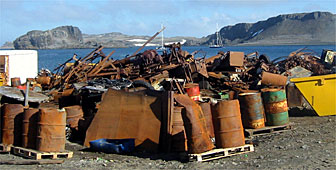Mission Antarctica cleans up Russian base

An international expedition has removed 1,000 tons of rubbish from a Russian research station in Antarctica.
One of the main sponsors of the project is Ernesto Bertarelli, chief executive of the biotechnology company, Serono.
In the fourth part of his Antarctic diary, Vincent Landon describes the effort to restore order at the Russian base at Bellingshausen.
Part Four: The clean-up
Five years ago, the beach at Bellingshausen was an eyesore, littered with old equipment, abandoned huts, scrap metal and barrels of liquid waste.
Today, the mountain of metal and waste has gone and penguins and seals have reclaimed the beach.
The story of the clean-up is a tale of vision and persistence. It has taken British polar explorer Robert Swan years of planning, fundraising and organisation.
“Everybody said “It’s impossible to work with the Russians to form a joint cooperation, to remove 1,000 tons of rubbish”, explained Robert.
“I said, “Well if it’s impossible, let’s just do it” and we did it and it happened. Had we gone through the right channels, then we’d still be sitting, talking about it.”
Distressing sights
On his expedition to the South Pole in 1986 and later on his walk to the North Pole in 1989, Robert had seen how rubbish was despoiling both the Antarctic and the Arctic. One of the most distressing sights was the dirtied beach at Bellingshausen on King George Island.
Eight countries – Argentina, Brazil, Chile, China, South Korea, Poland, Russia and Uruguay – maintain bases on the island.
By building a station and performing scientific research, countries can earn the status of a consultative party or full member of the Antarctic Treaty.
Russia set up its Bellingshausen station in 1968 at the island’s southwestern tip. Its normal population is about 30 though it has capacity for 50.
Adjacent to Bellingshausen is Chile’s Frei station which accommodates about 80 people. The two nationalities are separated by a stream, which marks a time zone. The Chileans are an hour ahead of the Russians.
Chile environment
Frei resembles a small village with more than 40 buildings, including 15 huts painted in bright colours, a hospital, school, bank and post office. The other half of the Chilean station, about a kilometre away, includes a 1,300 metre gravel runway.
“When you came into Maxwell Bay, the Chilean station had its little huts, all nicely painted,” recalled Robert.
“On the Russian side of the famous stream where the time change takes place, there were three times the amount of buildings, most of them half-broken down and rubbish spread 500 metres by 500 metres – fuel drums leaking, twisted pipe work, old machines, old tractors, old generators, oil leaking out everywhere. It looked diabolical.”
For four years, Robert employed a team of eight to ten Russians during the summer season to collect the rubbish into one pile.
Waste trip
This season, a joint UK / Russian team loaded the rubbish onto the Anne Boye, a Danish vessel, specially chartered to transport the 1000 tons of waste from Bellingshausen to Montevideo in Uruguay for recycling.
The small amount of mixed oils and paint residues which was reclaimed and which the Uruguayan plant could not deal with in an environmentally friendly manner was consigned to a specialist treatment company in Europe for disposal.
Teachers and students from around the world, representing 14 countries, participated in the project, helping at the end to remove smaller items like nuts and bolts.
A couple of days after the clean-up had finished, penguins started to return to the beach.
Larger goal
Much of the scrap, which the expedition removed, has lain in Antarctica for over 30 years. The Environmental Protocol of the Antarctic Treaty requires each country to remove its own rubbish and return the continent to the state it was 100 years ago when man first set foot on its shores.
Robert hopes that the Bellingshausen project will inspire other bases and countries to clean up their act. Hundreds of thousands of tons of waste remain in Antarctica, most of it generated by scientific research stations.
The project is part of Mission Antarctica’s larger goal to ensure the continued preservation of Antarctica for future generations as a natural reserve devoted to peace and science.
Next: The future of Antarctica

In compliance with the JTI standards
More: SWI swissinfo.ch certified by the Journalism Trust Initiative
You can find an overview of ongoing debates with our journalists here. Please join us!
If you want to start a conversation about a topic raised in this article or want to report factual errors, email us at english@swissinfo.ch.